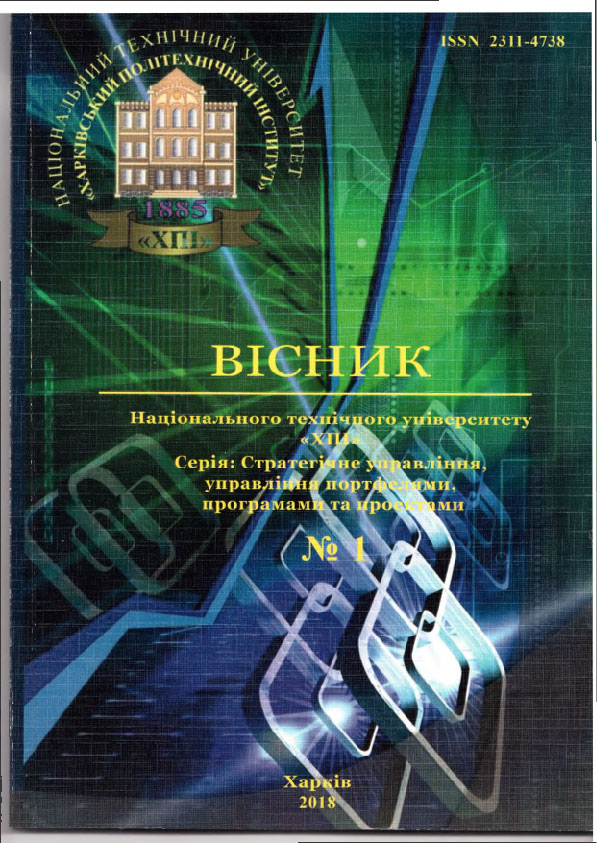EVOLUTION OF THE GENERALIZED BODY OF KNOWLEDGE ON PROJECT MANAGEMENT
DOI:
https://doi.org/10.20998/2413-3000.2018.1277.2Keywords:
fully plan-driven methodologies, Agile methodologies, the generalized body of knowledge, DSDM, FDD, principles, life cycles, roles and responsibilities, processes, practicesAbstract
An analysis of the literature on the creation and application of hybrid project management methodologies on the basis of fully plan-driven and Agile methodologies is made. It is shown that every year the volume of application of methodologies, which combines the advantages of fully plan-driven and Agile approaches is growing. To create a special methodology for a particular project, a generalized body of knowledge on project management can be used. The task is to complement the generalized body of knowledge on project management components of popular Agile methodologies DSDM and FDD. Currently, the generalized body of knowledge includes the components of PMBOK Guide, the ISO21500 standard, the PRINCE2 methodology, the SWEBOK Guide, agile methodologies Scrum, XP, and Kanban. The structure of the generalized body of knowledge on project management is given. DSDM principles and FDD values are added to it. The DSDM principles fall into three groups: values and principles relating to the interaction of team members, values and principles relating to the product of the project, and values and principles relating to the project team working technology. The values of FDD are only in the last group. The life cycles, roles, and responsibilities of these methodologies are described. The concept of a process for DSDM is proposed. The process in DSDM is actually the project life cycle. Other processes in DSDM are not provided. DSDM uses the concept of Products. The analysis showed that for this framework, the concepts of processes can be introduced. The creation of each DSDM product requires an appropriate process. As a result of the DSDM analysis, a set of processes was proposed. The proposed DSDM processes and FDD operations are inserted into the knowledge areas and process groups table of the generalized body of knowledge on project management. The DSDM and FDD practices have been added to the knowledge base.References
AXELOS. PRINCE2 Agile® Guidance. PPM Official Publisher, 2015. 360 p.
Nawrocki J. et al. Balancing Agility and Discipline with XPrince. Rapid Integration of Software Engineering Techniques, Second International Workshop. 2005. doi: 10.1007/11751113_19.
Alnoukari M., Alzoabi Z, Sheikh El A. Introducing discipline to XP: applying PRINCE2 on XP projects. 3rd International Conference on Information and Communication Technologies: From Theory to Applications. 2008. doi: 10.1109/ICTTA.2008.4530347
Richards K. Agile project management: Integrating DSDM into an existing PRINCE2® environment (White paper). The Stationery Office, 2013. Available at: https://www.agilebusiness.org/sites/default/files/agile-prince2-wp-v1_3-2013.pdf?token=VGGclRWk1
Andrew Craddock et. al. The DSDM Agile Project Framework for Scrum. 2012. Available at: https://www.agilebusiness.org/sites/default/files/the_dsdm_agile_project_framework_v1_11.pdf?token=yqzXtW1a1
Sliger M. Agile project management and the PMBOK® guide. PMI® Global Congress 2008. Newtown Square, PA: Project Management Institute, 2008. Available at: https://www.pmi.org/learning/library/agile-project-management-pmbok-waterfall-7042
Schwalbe K. Managing a Project Using an Agile Approach and the PMBOK® Guide. 2012. Available at: https://kathyschwalbe.files.wordpress.com/2013/06/managing-a-project-using-an-agile-approach-and-the-pmbokc2ae-guide.pdf
Kononenko I. V., Aghaee A. Model and Method for Synthesis of Project Management Methodology With Fuzzy Input Data. Bulletin of NTU" KhPI". Series: Strategic Management, Portfolio, Program and Project Management. 2016, no. 1 (1173), pp. 9-13. doi: 10.20998/2413-3000.2016.1173.2
Kononenko I. V., Aghaee, A. (2016). Formation of a generalized body of knowledge in project management. Management of Development of Complex Systems. 2016, (27), 44-53.
Kononenko I. V., Aghaee A. Processes of the generalized body of knowledge on project management. Radio electronics and computer systems. 2016, no 2 (76), pp. 80-94.
VERSIONONE. 10th annual state of agile survey. 2015. Available at: https://versionone.com/pdf/VersionOne-10th-Annual-State-of-Agile-Report.pdf
DSDM Handbooks. 2014. Available at: https://www.agilebusiness.org/resources/dsdm-handbooks
Highsmith J. Agile Software Development Ecosystems. Addison–Wesley, Boston, MA, 2002.
Yilmaz M, O‘Connor V. R., Clarke P. A Systematic Approach to the Comparison of Roles in the Software Development Processes. Communications in Computer and Information Science. 2012, pp. 198-209. doi:10.1007/978-3-642-30439-2_18
Goyal S. Major Seminar On Feature Driven Development. Agile Techniques for Project Management and Software Engineering. 2007. Available at: https://pdfs.semanticscholar.org/35c8/a718b8c9483d5a3b6dc08dc61036fe0f54e0.pdf
Gorakavi P. K. Build Your Project Using Feature Driven Development. 2009. Available at: http://www.ipma-usa.org/articles/A4_AboutFDD.pdf
Feature Driven Development Processes. Available at: http://www.featuredrivendevelopment.com/node/449
Downloads
Published
Issue
Section
License
Copyright (c) 2018 Igor Vladimirovich Kononenko, Svitlana Yuryevna Lutsenko

This work is licensed under a Creative Commons Attribution-NonCommercial-ShareAlike 4.0 International License.
Our journal abides by the Creative Commons copyright rights and permissions for open access journals.
Authors who publish with this journal agree to the following terms:
Authors hold the copyright without restrictions and grant the journal right of first publication with the work simultaneously licensed under a Creative Commons Attribution-NonCommercial-ShareAlike 4.0 International License (CC BY-NC-SA 4.0) that allows others to share the work with an acknowledgement of the work's authorship and initial publication in this journal.
Authors are able to enter into separate, additional contractual arrangements for the non-commercial and non-exclusive distribution of the journal's published version of the work (e.g., post it to an institutional repository or publish it in a book), with an acknowledgement of its initial publication in this journal.
Authors are permitted and encouraged to post their published work online (e.g., in institutional repositories or on their website) as it can lead to productive exchanges, as well as earlier and greater citation of published work.

